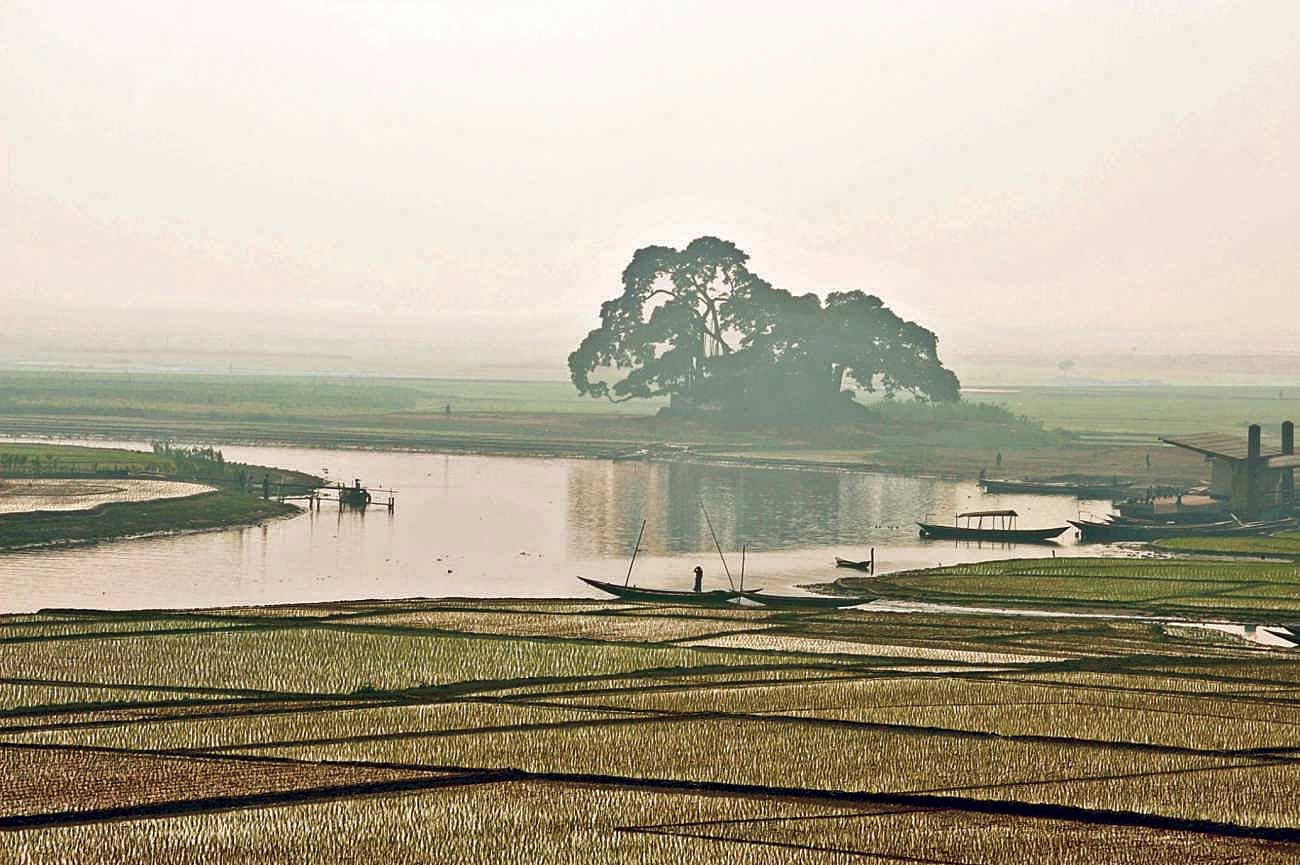AWAY FROM HOME

During my childhood I had two homes to return to. My father was a landowner in the hinterland of Faridpur not far from the mighty Padma. His homestead was there. My Nana's house was in Dacca new Dhaka. My mother naturally shuttled between the two homes every year with her son and later her daughter and occasionally with her husband.
Generally winter was shared between the two homes. The onset of winter was spent in the village homestead and the rest in the Dacca home. The month of Agrahayan (middle of November to middle of December) saw the onset of festivity. Days were warm with the new harvest and the nights became delightfully cool.
Date tree juice and molasses were added to the new rice. So there was Bhijainna Pitha (Rice cake soaked in syrupy mixture of milk, date tree juice and molasses); there was Doodh Kodu (strings of bottle gourd soaked in milk). Folks reveled and others returned home for a vacation. In a moonlit night a crooner from among my folks delighted everybody huddled around in the courtyard with Jaganmoy Mitra’s songs.
Meanwhile my nani and khala in their letters would be trying to persuades my mother to come to Dacca for winter. My father found it was in the cards. It was the middle of Magh (middle of January to middle of February).
The day arrived for the journey away from Nasirpur. My father was to stay back, one of my father's cousins was to accompany us. The holdall was rolled up, the portmanteau was packed. My two-year old sister in her gharara was prancing around with joy. My mother was giving instructions to the domestic workers to do their chores properly so that 'Saijja Bhai' was not bothered.
My unwed Fupu (father's first cousin) came rushing from the next house in tears rushing to the arms of my mother, her wailing Bhabi! My mother was wiping away tears scanning the place. Then she put on a black burqa with a veil over the eyes. My Dadi was gone. My mother touched the feet of my father's mama and mami. They placed their hand on my mother's head.
She got into a palanquin with my sister. My father was on a horse with me in front of him. The bearers of the palanquin trudged along and my father's and my uncle's horses plodded on through the village trail hardened by caked mud. The village housewives and girls came out of their houses to take a look at the lady from the town. But she was not to be seen for the palanquin had a purdah. We reached the village market, Chowdhuryhat. The tea stall owner under the banyan tree warmly invited my father and his retinue inside for a cup of tea. My sister and I were given batasahs (sweets made from sugar) and lathi biscuit. A cup of tea was sent inside for my mother.

The Goyna Nouka (big boat) was anchored. We boarded it. My sister and I were placed on the shoulders of two sturdy men clasping their necks. The boat cruised through a canal and reached the Padma. A steamer was in the mid-stream. I later understood the steamer was perhaps from Goalondo cruising downstream. My father bade us goodbye. His wistful gaze showed how much he would miss us, especially my sister. The steamer was large; we climbed to the deck and settled ourselves on a bench. The night descended - it was chilly. My sister slept on my mother's shoulder and I huddled on her lap. My father's cousin took care of us. We passed Bhagyakul - a river station of those times and notable for Kundu Zamindarbari.
It was perhaps dawn, the lights were on, the darkness was fading away when we arrived at Narayanganj Steamer Ghat. My mother was beaming; my sister, huddled in her lap, was curiously looking up at her in her innocence. My chacha was packing up things to disembark. By that time the rambunctious coolies were all around. They hustled and bustled and one of them took hold of our baggage. He was sprightly with the portmanteau on the head and the holdall in the hand.
We were comfortably settled in the compartment of the train. The lights were coming out. The train chugged on. Before long we were at Fulbaria Railway Station. My mother's first cousin was waiting there on the platform. The hackney carriage was there. A coolie put the baggage on the roof. We got inside the carriage. The shutters were turned up. My mamu hollered chalo miah chalo. The carriage trotted on through Nazirabazar, Bangshal,and Mahuttuly and on to my nana's house.
Two white sheets were held on the two sides of the carriage door. My mother stepped out and went into the back alley of the house. From there we walked up the stairs into the first floor. My mother huddled together with her two unwed sisters after embracing her mother. I went to where my nani was sitting on a bed. She brought me closer to her arms. A song was ironically wafting around outside aye mere dil kahi aur chal?

 For all latest news, follow The Daily Star's Google News channel.
For all latest news, follow The Daily Star's Google News channel. 



Comments